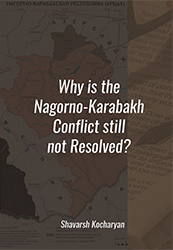Shavarsh Kocharyan “Why is the Nagorno-Karabakh conflict still not Resolved”, 2016
“Why is the Nagorno-Karabakh conflict still not Resolved”

By Shavarsh Kocharyan
MIA Publishers, Yerevan 2016
The current phase of the Nagorno-Karabakh issue has started since the last years of the existence of the USSR and turned into a conflict as a result of the policy of power adopted by Azerbaijan in response to the implementation of the right to self-determination by the people of Nagorno-Karabakh. The Nagorno-Karabakh conflict differs from other conflicts of the former Soviet area by the fact that the people of Nagorno- Karabakh impeccably implemented its right to self-determination within the legal frameworks before the collapse of the Soviet Union.
The Nagorno-Karabakh conflict was the bloodiest conflict of the post-Soviet area with tens of thousands of victims, hundreds of thousands of refugees and massive destruction. The military phase of the confl ict ended in May 1994 with an open-ended ceasefire agreement. Notably during the past 22 years the large-scale military operations have not been renewed, and the relative peace has been preserved without the involvement
of international peacekeeping forces.
The mediators in the negotiation process of the Nagorno-Karabakh confl ict resolution are the 3 out of the 5 permanent members of the United Nations Security Council – Russia, the USA and France. Despite the consistent efforts of the mediators, the Nagorno-Karabakh confl ict remains unresolved. The main reason is that Azerbaijan acts in contrary to the purposes of the United Nations.
The opinions presented below may differ from the opinions of the Nagorno-Karabakh Republic (NKR).
FILES:
- Shavarsh Kocharyan “Why is the Nagorno-Karabakh conflict still not Resolved” (in English)
- Шаварш Кочарян “Почему пока не урегулирован Нагорно-Карабахский конфликт” (in Russian)
Content
Introduction
1. The Essence of the Issue is the Realization of the Right to Self-Determination of the People of Nagorno-Karabakh
2. The Conflict is a Result of the Policy of Use of Force Initially Adopted by Azerbaijan
3. Th e Right to Self-determination of Peoples and the Territorial Integrity of States
4. NKR Established as a Democratic State
5. The Role of the Republic of Armenia
6. The Current Stage of the Negotiation Process
7. What Prevents the Establishment of Confidence-Building Measures among the Sides
8. Positions of the Armenian Sides
Map








